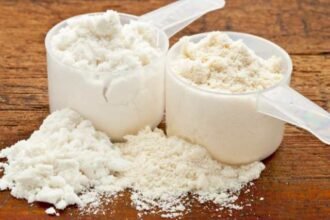A versatile herb that has been used in traditional medicine for a long time, mugwort has recently become famous because it may be good for you when you drink it as a tea.
People have known for hundreds of years that this simple plant, whose formal name is Artemisia vulgaris, can heal. It is related to daisies.
This piece will talk about the health benefits and nutritional facts of mugwort tea. It will also look at why this old drink is becoming popular again in the wellness world today.
Nutritional Profile of Mugwort Tea
It is possible that mugwort tea is good for you because it contains a lot of important nutrients. There are a lot of antioxidants in the plant, such as flavonoids and phenolic compounds. These help the body get rid of harmful free radicals, which lowers oxidative stress and inflammation. [Source]
An important part of mugwort is a chemical called artemisinin, which has been studied a lot for its ability to kill malaria parasites. Mugwort also has minerals like iron, calcium, and magnesium, as well as vitamins A, C, and E. All of these are very important for keeping your body in good shape. [Source] [Source]
Nutrition Tips
Mugwort tea provides 20% of the daily vitamin A requirement in one cup. Vitamin A is needed for vision, immunity, and cell growth. Mugwort tea can help plant-based and vegan diets get extra vitamin A, which is harder to get from non-animal sources.
Potential Health Benefits of Mugwort Tea
1. Digestive Aid
Historically, mugwort tea has been utilized to help with a range of digestive problems, including bloating, constipation, and indigestion. [Source]
The carminative properties aid in eliminating gas from the intestines, offering relief from discomfort caused by gas buildup.
Moreover, the bitter compounds in the herb can boost the production of digestive enzymes, helping to break down food and enhance digestion. [Source]
2. Menstrual Relief
Throughout history, mugwort tea has been a popular choice among women seeking relief from menstrual cramps and other period-related discomforts. [Source]
Many believe that the herb’s properties can regulate menstrual flow and ease symptoms such as cramping, bloating, and mood swings. Some women find mugwort tea beneficial for balancing irregular menstrual cycles.
3. Antimicrobial Properties
Mugwort tea has strong antimicrobial properties due to its variety of essential oils and compounds such as thujone and camphor. [Source]
Mugwort tea has demonstrated the ability to hinder the growth of different bacteria, fungi, and viruses, suggesting its potential as a natural aid in enhancing immunity and combatting infections. [Source]
4. Skin Health
The antioxidants and anti-inflammatory compounds in mugwort tea can help improve skin health.
When ingested or used on the skin, tea can assist in calming skin irritations, decreasing inflammation, and enhancing wound healing. [Source]
In U.S and U.K, few people suggest mugwort tea as a natural solution for skin issues such as eczema and psoriasis, but further research is necessary in this field.
5. Cognitive Support
Initial findings indicate that mugwort tea could potentially improve cognitive function and brain health. [Source]
This herb has compounds that could potentially safeguard brain cells from oxidative stress and inflammation, which may lower the risk of neurodegenerative conditions such as Alzheimer’s and Parkinson’s. [Source]
Nevertheless, further research is necessary to validate these potential advantages.
6. Insomnia and Anxiety Relief
Traditionally, mugwort tea is known for its calming properties and ability to promote sleep. The herb contains compounds such as thujone and camphor, which can aid in promoting relaxation and easing symptoms of anxiety and insomnia. [Source]
It’s crucial to seek advice from a healthcare professional before trying mugwort tea for these reasons, as it could have interactions with specific medications.
Brewing and Consuming Mugwort Tea
To enjoy the potential benefits of mugwort tea, it’s essential to brew it correctly. Here’s a simple guide:
Ingredients:
- 1-2 teaspoons of dried mugwort leaves or flowers
- 1 cup of hot water
- Honey or lemon (optional)
Instructions:
- Bring fresh water to a boil in a kettle or pot.
- Place the dried mugwort leaves or flowers in a teapot or infuser.
- Pour the hot water over the mugwort, and let it steep for 5-7 minutes.
- Strain the tea into a cup, and optionally add a touch of honey or lemon for flavor.
- Sip and enjoy your warm cup of mugwort tea.
Potential Downside
While mugwort tea offers numerous potential health benefits, it’s important to be aware of its potential interactions with certain medications. Mugwort contains compounds like thujone and camphor, which can interfere with the metabolism and effectiveness of some drugs, particularly those metabolized by the cytochrome P450 enzyme system in the liver.
Remember that mugwort tea is typically safe for most people in moderate amounts, but it could interact with specific medications or lead to negative effects in certain individuals.
It is advisable for pregnant women and individuals with specific medical conditions to seek advice from a healthcare provider before drinking mugwort tea.
Conclusively, mugwort tea is an intriguing historical drink that provides numerous potential health advantages.
With its digestive-soothing properties, antimicrobial, and anti-inflammatory effects, this modest herb provides a wide range of benefits.
It’s important to seek guidance from a healthcare professional and practice moderation when adding mugwort tea to your wellness routine, just like with any natural remedy.
Tap into the age-old knowledge of this plant and discover the potential advantages firsthand.








